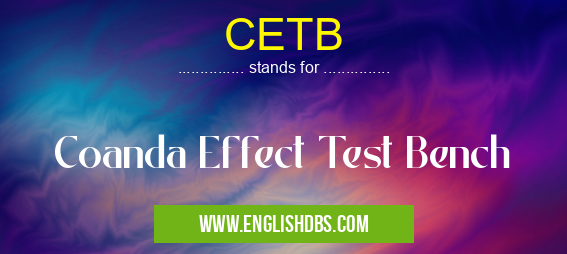What does CETB mean in UNCLASSIFIED
The Coanda Effect Test Bench (CETB) is a specialized testing apparatus designed to evaluate the Coanda effect, a physical phenomenon where a fluid jet attaches itself to a nearby surface, even if that surface is curved.

CETB meaning in Unclassified in Miscellaneous
CETB mostly used in an acronym Unclassified in Category Miscellaneous that means Coanda Effect Test Bench
Shorthand: CETB,
Full Form: Coanda Effect Test Bench
For more information of "Coanda Effect Test Bench", see the section below.
- CETB stands for Coanda Effect Test Bench.
- It is a specialized test bench used to evaluate and characterize the Coanda effect.
Coanda Effect
- The Coanda effect is a fluid dynamics phenomenon where a fluid jet tends to follow a nearby curved surface.
- This effect is caused by the low-pressure region created on the curved surface, which draws the fluid jet towards it.
CETB Components
- Fluid supply system: Provides compressed air or other fluid to the test bench.
- Nozzle: Generates a fluid jet.
- Curved surface: Simulates a surface that the jet will interact with.
- Sensors: Measure pressure, temperature, and other parameters to analyze the Coanda effect.
- Control system: Automates the test process and collects data.
CETB Applications
- Aerodynamics: Studying the behavior of fluid jets in aircraft engines, wings, and other aerodynamic surfaces.
- Fluidics: Designing microfluidic devices and systems that utilize the Coanda effect for control and manipulation of fluids.
- Robotics: Developing fluidic actuators and sensors based on the Coanda effect.
- Industrial processes: Optimizing fluid flow in industrial applications, such as fluid mixing, spraying, and cooling.
Essential Questions and Answers on Coanda Effect Test Bench in "MISCELLANEOUS»UNFILED"
What is the Coanda Effect Test Bench (CETB)?
What are the components of the CETB?
The CETB typically includes a fluid supply system, a nozzle to generate the fluid jet, a test surface with adjustable geometry, sensors to measure fluid flow and pressure, and a data acquisition system.
How is the Coanda effect measured using the CETB?
The CETB allows researchers to control and vary the parameters affecting the Coanda effect, such as jet velocity, surface shape, and fluid properties. By measuring the fluid flow and pressure distribution on the surface, they can quantify the attachment strength and other characteristics of the Coanda effect.
What are the applications of the CETB?
The CETB is used in various fields, including:
- Aerodynamics: Studying the behavior of fluids around aircraft wings and other curved surfaces.
- Fluid dynamics: Investigating fluid-surface interactions in industrial processes and natural phenomena.
- Microfluidics: Developing miniaturized devices that utilize the Coanda effect for fluid manipulation.
Who can benefit from using the CETB?
The CETB is a valuable tool for researchers, engineers, and scientists in fields such as:
- Aerospace and aeronautical engineering
- Fluid mechanics and heat transfer
- Microfluidics and microelectronics
- Biomedical engineering
Final Words:
- CETB is a valuable tool for researchers and engineers to study and characterize the Coanda effect.
- It enables the development of innovative designs and technologies in various fields, including aerodynamics, fluidics, robotics, and industrial applications.
